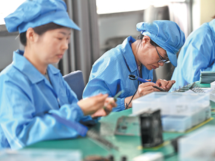'Little giants' show their might with innovative products
Updated: 2023-08-11

Workers weld weather detectors on the assembly line at a tech-driven small business in Taiyuan, Shanxi province. [Photo by Ruan Yang for China Daily]
High-quality small and medium-sized enterprises are playing an increasingly important role in the economic development of Shanxi province, especially those in the "specialized, refined, differential and innovative" categories.
As these businesses focus on segmented markets, feature innovation, possess high market share and boast cutting-edge technologies, they are viewed as a vital force to drive Shanxi's economic transformation, a move that highlights upgrading traditional industries toward the directions of cleaner and more efficient operations and fostering emerging industries as new growth engines.
In Shanxi, leading the specialized, refined, differential and innovative enterprises are "little giants": 139 at national level and 363 at provincial level, according to local statistics.
In China, little giants refer to SMEs that are in the early stage of development and focus on cutting-edge sectors such as new generation information technology, advanced equipment manufacturing, new energy, new materials and biomedicine.
Taiyuan-based Jinbo Bio-Pharmaceutical is one such national-level little giant. It went public on the Beijing Stock Exchange on July 20, becoming the third company in Shanxi listed in this bourse for innovative SMEs.
Jinbo's cutting-edge product is recombined human-origin collagen III. It is a product at a globally advanced level, which can be used in different sectors ranging from surgery, gynecology and dermatology to skin care, according to Yang Xia, founder and chairwoman of the company.
Yang said the company began the research and development of the medicine in 2009, one year after its founding.
"Unlike other industries, the R&D of new medicines needs more time – at least 10 years," Yang said. "And it also requires a company to consistently invest in R&D and continuously improve its innovative strength."
This is exactly the case of Jinbo, which announced the successful development of the collagen in 2018, after the painstaking efforts of its research team.
Yang said Jinbo is now one of the few enterprises in the world that mass produce the collagen. Its volume production began in 2021, after winning approval from the National Medical Products Administration.
In May this year, the first phase of Jinbo's synthetic biology park became operational. It is now the largest production facility for human-origin collagen in China. Upon the completion of all its planned phases, the project is expected to become a huge facility with annual output value surpassing 10 billion yuan ($1.39 billion), according to Yang.
Jiashida Robot is another Shanxi company on the list of national-level little giants.
According to Sun Xiaopu, the company's vice-president for technology, Jiashida began to develop intelligent robots for household use in 2012.
It is now a leading domestic producer of window-swiping robots in terms of market share. The products have also been sold to more than 50 countries, Sun said.
Behind its rapid growth is heavy investment in R&D, said Sun, who added that Jiashida is the holder of six overseas patents and 134 Chinese patents.
Wenlong Zhongmei, based in Taiyuan, is another example of how a little giant company can play a crucial role in upgrading Shanxi's coal industry.
The company is the developer of separated-strata grouting technology, which is used to support mining shafts, improving efficiency and safety.
Huoer Xinhe Coal Mine in the Shanxi city of Changzhi is a client of Wenlong Zhongmei. It began to use the separated-strata grouting technology in early 2022.
"Thanks to the technology, we have seen the mining recovery rate increase from 75 percent to 89 percent in one and a half years," said an executive of the coal mine.
He added that as disposed fly ash and recycled wastewater from mining are used for grouting, the technology also features great environmental benefits.
He said over the period, a total of 430,000 metric tons of fly ash and 300,000 tons of recycled water have been used for grouting.
"The improving recovery rate and the use of recycled resources mean a direct benefit worth 770 million yuan during the period," the executive said.
Fan Xunzhu, general manager of Wenlong Zhongmei, said he expects his company to play a role in the low-carbon and sustainable development of China's coal industry.
"China is the No 1 coal producer and consumer in the world, with coal accounting for about 56 percent of the consumption of all energy resources," Fan said. "We hope to promote our technologies to more mining sites for the fulfillment of China's carbon peak and neutrality targets."
Cao Tingting contributed to this story.



